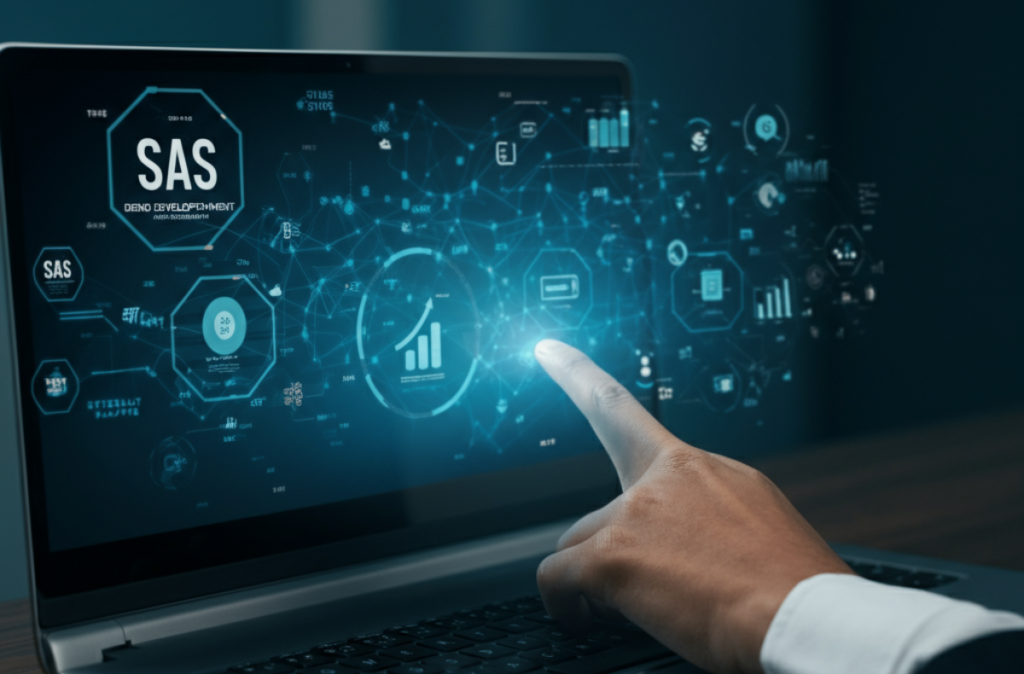The SaaS development in 2025 has evolved into a powerful driver of digital transformation across industries. Furthermore, with the SaaS market experiencing exponential growth, businesses are increasingly adopting SaaS solutions. As a result, these solutions help to improve operational efficiency, scalability, and user experience. Additionally, emerging trends such as AI integration and heightened security standards are shaping the future of SaaS. Ultimately, it is becoming an exciting space for businesses to explore.
This guide examines the latest trends, data, and insights that reflect how SaaS development leads the charge in digital transformation.
Key Takeaways
- SaaS Development drives digital transformation, with the global market projected to reach $307.3 billion by 2025.
- AI and machine learning enhance user experience, operational efficiency, and automation within SaaS applications.
- Industries like healthcare, retail, and manufacturing are rapidly adopting SaaS solutions for their specific needs.
- Security and compliance are critical, with advanced protocols ensuring data protection and adherence to regulations.
- SaaS development offers cost-efficiency, flexibility, and scalability, making it essential for business growth in 2025.
Table of Contents
Global SaaS Market Growth in 2025
The global SaaS market continues to grow, with projections placing its value at $307.3 billion by the end of 2025. This will capture a significant share of the overall software market. This growth is fueled by the increasing adoption of cloud technologies and remote work models. Additionally, there is a need for flexible, scalable solutions. SaaS application development is no longer limited to large enterprises. Small and medium-sized businesses (SMEs) also leverage SaaS to meet their growing digital demands.
Emerging Technologies in SaaS Development
One of the most notable trends in SaaS platform development is integrating artificial intelligence (AI) and machine learning (ML). Here’s how these technologies are shaping SaaS in 2025:
- Enhanced User Experience: AI-powered chatbots, recommendation systems, and predictive analytics offer users personalized and seamless experiences.
- Operational Efficiency: Businesses utilize ML algorithms to optimize processes like inventory management, customer segmentation, and fraud detection within SaaS applications.
- Automation: SaaS product development incorporates AI for automating repetitive tasks, reducing human error, and saving valuable time for users.
Adoption Rates Across Sectors
SaaS adoption rates are surging across industries, with some sectors experiencing faster growth due to innovative use cases:
- Healthcare: SaaS improves patient care by streamlining electronic health records (EHRs), appointment scheduling, and telemedicine platforms.
- Retail: Retailers use SaaS app development to optimize inventory, enhance customer relationship management, and run dynamic pricing strategies.
- Manufacturing: SaaS solutions enable smart factory integrations, predictive maintenance, and supply chain optimization.
These sectors illustrate how SaaS development services provide businesses with the tools to remain competitive in dynamic markets.
Evolving Security and Compliance Standards
With the growing reliance on SaaS, security and compliance remain top priorities for businesses and SaaS development companies in 2025:
- Enhanced Security Protocols: Secure development SaaS practices now include advanced encryption, multi-factor authentication, and continuous penetration testing to protect sensitive data.
- Compliance with Global Standards: SaaS providers ensure adherence to evolving regulations such as GDPR (Europe) and CCPA (California) to build trust and avoid legal challenges.
- Data Ownership: SaaS application developers provide clear agreements outlining data management policies, ensuring transparency and security for users.

SaaS Development Technical Aspects
SaaS technical aspects involve how the application of SaaS solutions works based on how they are being developed.
Data Management and Ownership
SaaS gets the data approval before it can compile and use the information belonging to the customers. The providers use specific measures to control the user information stored on these centralized servers. For example, employing robust security and encryption features to ensure the user data is only accessible by the designated admin. The providers send an ownership contract of how their data is safeguarded and stored.
Improve the Performance Reliability and Loads.
Where SaaS enhances the performance and functionalities of resources in use, the cloud, on the other hand, handles the distribution of resources to ensure that organizational load is evenly distributed across resources without degrading them.
Security and Compliance in SaaS Development
Cloud deploys security measures for various functions by compliance with security protocol. Cloud security operates with the set guidelines and policies needed to guarantee the safety of the data from any data fraud and cybersecurity threats.
Integrations
SaaS enables other applications to interconnect with it through APIs without being programmed extensively. In this way, API helps SaaS apps for information transfer as per the specific protocols set. The access point identifier (API) will check to confirm the authenticity of the data before allowing data transfer to go through.
Mobile Responsive
SaaS development requires the creation of version apps that are equivalent to mobile apps with simple features and capabilities. Then, the build versions are tailored for tablets and computers.
Benefits of SaaS Development in 2025
SaaS offers numerous benefits that make it invaluable for businesses:
- Cost-Efficiency: SaaS does not require hardware investments or extensive maintenance, keeping infrastructure costs low for businesses.
- Flexibility: SaaS applications are accessible from any device with an internet connection, offering unmatched convenience for users.
- Scalability: Businesses can scale their resources up or down based on current needs. This provides a tailored solution for every growth stage.
Conclusion
SaaS development has become a key enabler of digital transformation in 2025. It empowers businesses to operate more efficiently, securely, and flexibly. Emerging trends like AI integration, robust security measures, and high scalability are helping organizations stay competitive in an increasingly complex digital environment. Whether considering a SaaS MVP development project or hiring SaaS developers for a custom application, investing in SaaS development consulting can unlock endless possibilities for your business.
FAQs
Yes. A solo developer can create a basic SaaS app with the right tools and knowledge. However, larger-scale projects often require collaboration with a SaaS development company.
Outsourcing SaaS development allows businesses to access expert developers, reduce costs, and accelerate project timelines.
When selecting a SaaS software development company, focus on experience, portfolio, security practices, and the ability to meet your business’s unique needs.
Choose SaaS developers who prioritize secure practices like encryption, regular security audits, and adherence to compliance standards.
While all industries can benefit, healthcare, retail, and manufacturing are experiencing significant transformations due to SaaS adoption.











